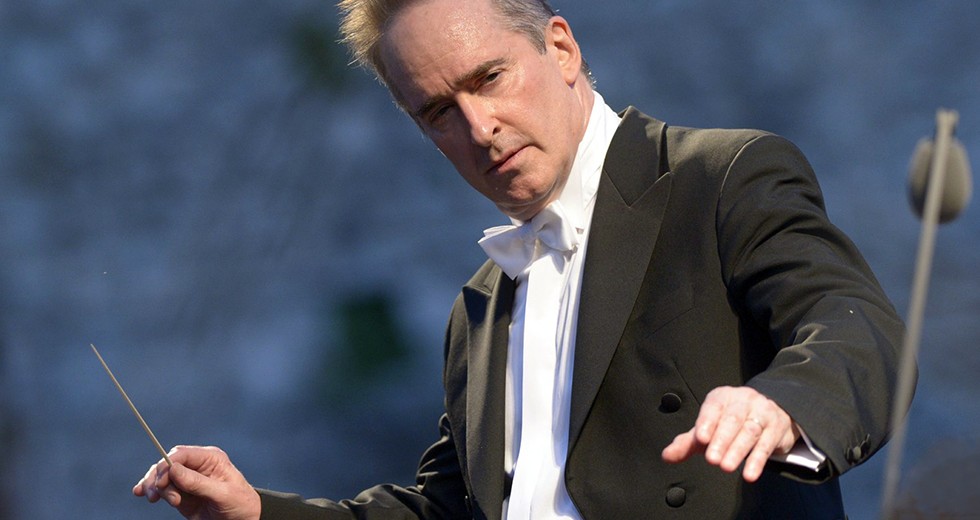
This summer marks 41 years since I first visited Ravinia, 38 since I first conducted here, and 10 years since I became music director of the Chicago Symphony Orchestra’s residency.
Ravinia has been with me in one form or another for almost the entirety of my adult life. I have conducted many concerts, met many people, watched the CSO go through an entire generational change and made many friends.
I designed my programs for this my final season as music director to represent some of the major themes of the past 11 seasons. Each of the five programs has great significance for me.
This is a condensed version of an article appearing in the July 5 issue of Ravinia magazine. To read the full version, click here.
The concert on July 22 is a re-creation of one of the two programs I conducted for my Ravinia-debut weekend in 1977. For that original performance, Mozart’s Piano Concerto in A Major, K. 488, was played by John Browning, who back then was a fixture at the festival, and this year’s concert will feature Garrick Ohlsson, who has similarly become a regular guest at Ravinia. Mahler’s First Symphony made up the second half. At the time, I chose two pieces I loved, but the program in a way previewed the major cycles of those two composers’ works I would present over my years as music director.
The Russian repertory has also had a major presence during my Ravinia tenure. The three composers represented on my July 23 program — Mussorgsky, Rachmaninov and Shostakovich — along with Tchaikovsky, are the core of the Russian orchestral repertory. Mussorgsky wrote few works solely for orchestra [but] I can think of almost no composer with so few completed works that conversely has had an extensive influence on 20th-century music. The three orchestral pieces from Khovanshchina are but a small taste of this massive and powerful opera. Spiritually, Shostakovich was to the 20th century what Mussorgsky was to the 19th. Mussorgsky and Tchaikovsky were on opposite sides of the 19th-century polemics in Russian music, and one could say that Shostakovich and Rachmaninov continued those lines respectively in the 20th.
In my first year at the festival, I inaugurated a series featuring composers whose works were suppressed during their lifetimes. We called the series “Breaking the Silence” at Ravinia (I employed the name “Recovered Voices” in Los Angeles). To represent this cause this season, I have chosen to feature Alexander Zemlinsky and his massive tone poem Die Seejungfrau, which is based on Hans Christian Andersen’s The Little Mermaid. Die Seejungfrau represents all of that music that is gradually regaining a much deserved place in the repertory more than half a century after the atrocities that almost consigned them to oblivion.
Zemlinsky was brought up in the school of Johannes Brahms, and so for the July 29 program, I thought pairing these two composers, by way of the latter’s First Piano Concerto, was an appropriate way also to salute one of my many fruitful collaborators: Jorge Federico Osorio, who has appeared with me as much or more than any other soloist.
I feel that the longer I live, the more I love Tchaikovsky’s music. With each year I discover more music to love (I just conducted The Queen of Spades for the first time) and more to love in the music I already know. An all-Tchaikovsky concert has been a Ravinia staple for years. The form is usually the violin or a piano concerto plus an orchestral piece, ending with the “1812” Overture. Upon learning that Maxim Vengerov was available, it was an obvious year to choose the violin concerto.
Although I have conducted The Nutcracker in its entirety as a concert piece, to my regret I have never done the complete Swan Lake. For the Aug. 1 concert, I decided to represent that as-yet-unfulfilled wish with several excerpts instead of the traditional suite.
An important feature of almost every Ravinia season has been a concert opera. The highlights include Verdi’s Otello, Aida and Rigoletto; Puccini’s Madama Butterfly and Tosca, and Richard Strauss’ Salome. While I do not consider any operatic season complete without at least one Mozart, Verdi or Wagner opera, I have never conducted any of the latter here.
To rectify that omission, The Flying Dutchman will be my final concert, on Aug. 15. I am grateful for the collaboration with the Chicago Symphony Orchestra and the Chicago Symphony Chorus over these years, and I liked the idea that I would finish my years as Ravinia’s music director together with all of them on the stage of the pavilion.
Note: In future issues of this season’s Ravinia magazine, James Conlon will recall his favorite moments of conducting at the festival since his 1977 debut.